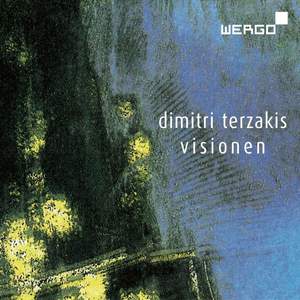For almost half a century Dimitri Terzakis has been living in Germany. As a student of the composition class of Bernd Alois Zimmermann, he very quickly chose a quite individual style – and got back to the roots of the music of his native country, Greece. Terzakis delved into the tonal system of ancient Greece and discovered undreamt of possibilities in the formation of melody and tonality beyond major and minor. Micro-intervals and sliding pitches as well as the realization of the finest dynamic nuances are important for melodic flexibility in his music.
The violin duo Legetos from 1988 (which begins this programme) – with its two-voice linearity and fascinating spatial effects – offers a characteristic look into the originality of Terzakis’ sound world.
All the other works on this CD are in different ways inspired by literature in different ways. In his Sappho Cycle, Terzakis draws on a number of fragments by this ancient poet and, at the end, on a complete poem that was recently discovered.
The instrumental reflection on the poem A une Madone from Les Fleurs du mal by Charles Baudelaire is not programme music, but rather a musical representation of the poem's peculiar atmosphere which comes into being through the alternation of eroticism and the demonic.
Unusual and extraordinarily interesting in terms of sound is the instrumentation of the choral work Visionen, where the text source is the Apocalypse of St. John. Here, along with the choir, there is not only a narrator, but also a solo viola.
With his Sonate infernale, Terzakis refers, on the one hand, to Dante’s Divine Comedy, which inspired many composers in the past. On the other hand, his choice of the traditional genre of the violin-piano sonata opened new ways to shape sound in the form of a dialogue.
Artists
Karla Beyer (violin), Lucie Leker (violin), Brigitte Fassbaender (narrator), Andreas Kersten (piano), Kolja Lessing (violin), Ute Loeck (narrator), Christiane Lorenz (flute), Tatjana Masurenko (viola), Andres Maupoint (piano) & Antigone Papoulkas (soprano)
Thomanerchor Leipzig & Münchner Rundfunkorchester, Georg Christoph Biller & Ulf Schirmer



